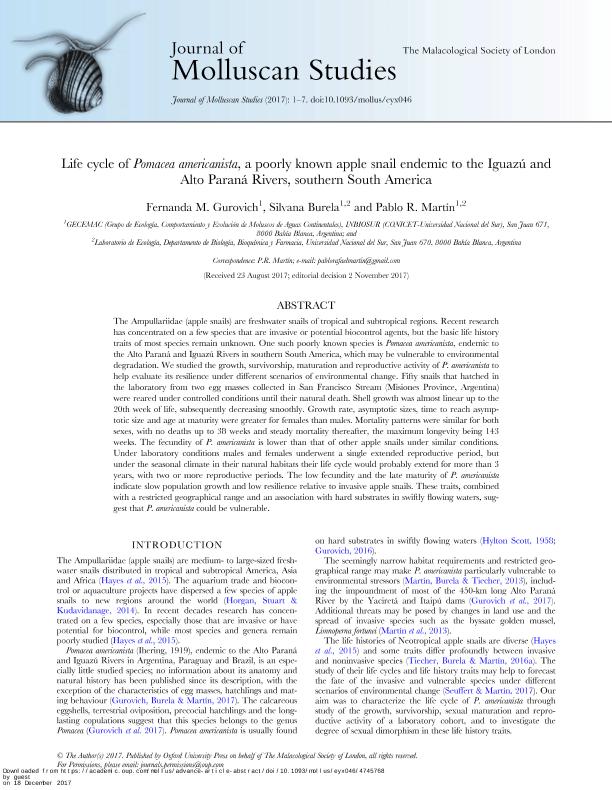Mostrar el registro sencillo del ítem
dc.contributor.author
Gurovich, Fernanda Mariel

dc.contributor.author
Burela, Silvana

dc.contributor.author
Martín, Pablo Rafael

dc.date.available
2018-09-05T18:34:23Z
dc.date.issued
2018-02-18
dc.identifier.citation
Gurovich, Fernanda Mariel; Burela, Silvana; Martín, Pablo Rafael; Life cycle of Pomacea americanista, a poorly known apple snail endemic to the Iguazú and Alto Paraná Rivers, southern South America; Oxford University Press; Journal of Molluscan Studies; 84; 1; 18-2-2018; 62-68
dc.identifier.issn
0260-1230
dc.identifier.uri
http://hdl.handle.net/11336/58400
dc.description.abstract
The Ampullariidae (apple snails) are freshwater snails of tropical and subtropical regions. Recent research has concentrated on a few species that are invasive or potential biocontrol agents, but the basic life history traits of most species remain unknown. One such poorly known species is Pomacea americanista, endemic to the Alto Paraná and Iguazú Rivers in southern South America, which may be vulnerable to environmental degradation. We studied the growth, survivorship, maturation and reproductive activity of P. americanista to help evaluate its resilience under different scenarios of environmental change. Fifty snails that hatched in the laboratory from two egg masses collected in San Francisco Stream (Misiones Province, Argentina) were reared under controlled conditions until their natural death. Shell growth was almost linear up to the 20th week of life, subsequently decreasing smoothly. Growth rate, asymptotic sizes, time to reach asymptotic size and age at maturity were greater for females than males. Mortality patterns were similar for both sexes, with no deaths up to 38 weeks and steady mortality thereafter, the maximum longevity being 143 weeks. The fecundity of P. americanista is lower than that of other apple snails under similar conditions. Under laboratory conditions males and females underwent a single extended reproductive period, but under the seasonal climate in their natural habitats their life cycle would probably extend for more than 3 years, with two or more reproductive periods. The low fecundity and the late maturity of P. americanista indicate slow population growth and low resilience relative to invasive apple snails. These traits, combined with a restricted geographical range and an association with hard substrates in swiftly flowing waters, suggest that P. americanista could be vulnerable.
dc.format
application/pdf
dc.language.iso
eng
dc.publisher
Oxford University Press

dc.rights
info:eu-repo/semantics/openAccess
dc.rights.uri
https://creativecommons.org/licenses/by-nc-sa/2.5/ar/
dc.subject
Growth
dc.subject
Survivorship
dc.subject
Maturity
dc.subject
Fecundity
dc.subject.classification
Otras Ciencias Biológicas

dc.subject.classification
Ciencias Biológicas

dc.subject.classification
CIENCIAS NATURALES Y EXACTAS

dc.title
Life cycle of Pomacea americanista, a poorly known apple snail endemic to the Iguazú and Alto Paraná Rivers, southern South America
dc.type
info:eu-repo/semantics/article
dc.type
info:ar-repo/semantics/artículo
dc.type
info:eu-repo/semantics/publishedVersion
dc.date.updated
2018-08-23T18:56:38Z
dc.journal.volume
84
dc.journal.number
1
dc.journal.pagination
62-68
dc.journal.pais
Reino Unido

dc.journal.ciudad
Oxford
dc.description.fil
Fil: Gurovich, Fernanda Mariel. Consejo Nacional de Investigaciones Científicas y Técnicas. Centro Científico Tecnológico Conicet - Bahía Blanca. Instituto de Ciencias Biológicas y Biomédicas del Sur. Universidad Nacional del Sur. Departamento de Biología, Bioquímica y Farmacia. Instituto de Ciencias Biológicas y Biomédicas del Sur; Argentina
dc.description.fil
Fil: Burela, Silvana. Consejo Nacional de Investigaciones Científicas y Técnicas. Centro Científico Tecnológico Conicet - Bahía Blanca. Instituto de Ciencias Biológicas y Biomédicas del Sur. Universidad Nacional del Sur. Departamento de Biología, Bioquímica y Farmacia. Instituto de Ciencias Biológicas y Biomédicas del Sur; Argentina. Universidad Nacional del Sur. Departamento de Biología, Bioquímica y Farmacia. Laboratorio de Ecología; Argentina
dc.description.fil
Fil: Martín, Pablo Rafael. Consejo Nacional de Investigaciones Científicas y Técnicas. Centro Científico Tecnológico Conicet - Bahía Blanca. Instituto de Ciencias Biológicas y Biomédicas del Sur. Universidad Nacional del Sur. Departamento de Biología, Bioquímica y Farmacia. Instituto de Ciencias Biológicas y Biomédicas del Sur; Argentina. Universidad Nacional del Sur. Departamento de Biología, Bioquímica y Farmacia. Laboratorio de Ecología; Argentina
dc.journal.title
Journal of Molluscan Studies

dc.relation.alternativeid
info:eu-repo/semantics/altIdentifier/url/https://academic.oup.com/mollus/article-abstract/84/1/62/4745768
dc.relation.alternativeid
info:eu-repo/semantics/altIdentifier/doi/http://dx.doi.org/10.1093/mollus/eyx046
Archivos asociados
